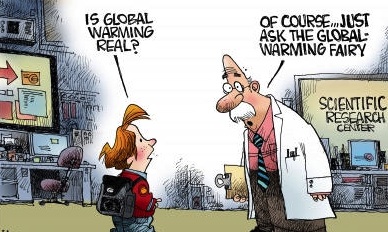
In the first five paragraphs of a recent dispatch from Stockholm, the Associated Press — in our estimation unwittingly, for the most part — exposes the deep corruption of the “global warming” enterprise:
Scientists working on a landmark U.N. report on climate change are struggling to explain why global warming appears to have slowed down in the past 15 years even though greenhouse gas emissions keep rising.
Leaked documents obtained by The Associated Press show there are deep concerns among governments over how to address the issue ahead of next week’s meeting of the Intergovernmental Panel on Climate Change.
Climate skeptics have used the lull in surface warming since 1998 to cast doubt on the scientific consensus that humans are cooking the planet by burning fossil fuels and cutting down CO2-absorbing forests.
The IPCC report is expected to affirm the human link with greater certainty than ever, but the panel is under pressure to also address the recent lower rate of warming, which scientists say is likely due to heat going deep into the ocean and natural climate fluctuations.
“I think to not address it would be a problem because then you basically have the denialists saying, ‘Look the IPCC is silent on this issue,’ ” said Alden Meyer, of the Washington-based Union of Concerned Scientists.
The first paragraph describes a scientific problem: a theory that has been put to an empirical test and found wanting. In the fourth paragraph, we get a passing discussion of alternative hypotheses. But this is presented as fundamentally a problem of political communication or public relations.
And these guys look shifty not just for scientists but for PR men. Specialists in crisis management emphasize the importance of building (or rebuilding) public trust by being both honest and forthcoming. But look at that Meyer quote. He’s not calling for forthrightness, just for some sort of statement so that critics — whom he disparages as “denialists” — can’t say the IPCC “is silent.”
The AP itself uses the term “climate skeptics,” which is less pointed than “denialists” but is still problematic. The purported opposition between “skeptics” and adherents to “the scientific consensus” is nonsensical, for skepticism is at the very heart of the scientific method. When the data call a theory into question, a scientist revisits the theory. Instead, the panel is employing the antiscientific method: It “is expected to affirm” the theory “with greater certainty than ever.”
And look how the AP sums up that theory: “that humans are cooking the planet by burning fossil fuels and cutting down CO2-absorbing forests.” That’s science fiction, not science. If Damon Knight were still with us, he might observe of the IPCC report: “It’s a cooked book.”
. . . . . . . . . . . . . . . . . . . .
James Taranto writes a column entitled “Best of the Web” for the Wall Street Journal.
